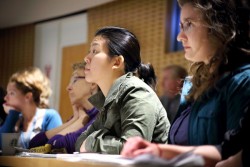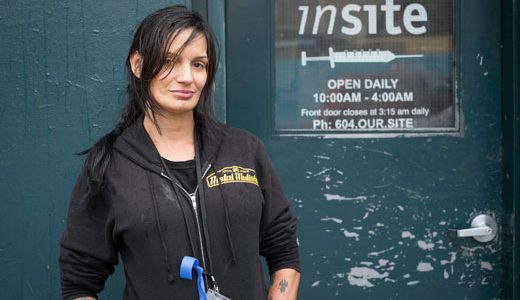The latest on our battle against overdose deaths
August 31 is International Overdose Awareness Day and our efforts to save lives continue to advance.

More than three-quarters of respondents said attending the Vancouver All-Staff Forum in June gave them a better understanding of VCH’s role in responding to BC’s overdose crisis.
“We’re implementing a comprehensive response plan focusing on attacking the issue from several angles,” says Dr. Patricia Daly, VCH chief medical health officer and vice president of public health.
Since the Vancouver All-Staff Forum on BC’s overdose crisis in June (recorded webcast here), there have been new developments in the areas of preventing overdoses, encouraging safer drug use, and providing treatment options for people with substance use disorders.
Services and strategies to save lives
VCH-Vancouver staff, physicians and partners are taking a number of steps to reduce opioid/fentanyl-related overdoses in Vancouver. What follows represents some notable examples while many more have been launched or are in development:
- Starting August 24, Vancouver’s Insite, North America’s first sanctioned supervised injection site, will remain open round-the-clock on the Wednesday, Thursday and Friday of each week social assistance cheques are distributed — and overdoses dramatically peak — for a six-month pilot project.
- A new Substance Use Treatment and Response Team (START) providing rapid access to at-home detox for those who need help stopping or stabilizing their substance use.
- Introducing take-home naloxone kits at all Vancouver urgent care centres (UCC) and emergency departments (ED) for physicians and nurses to give to patients who have presented for treatment and are at high risk of an overdose in the future. Both the VGH ED and UBC Hospital’s UCC will begin distributing these kits containing the life-saving antidote used to reverse opioid overdoses in September.
- Increasing the number of take-home naloxone kits throughout the community, including homeless shelters, supported housing facilities and First Nations communities. At least 200 staff at the Lookout Emergency Aid Society have been trained to administer naloxone.
- Work is underway to expand supervised injection services by embedding these services in facilities already providing care to injection drug users. VCH’s application to Health Canada for several new supervised injection services will be completed this fall.
- Planning continues to develop additional spaces for addictions (detox) treatment.
“Vancouver is a national leader in how we manage opioid addiction,” said Dr. Daly at the June Vancouver All-Staff Forum. “We are laden with experts in this field … so it’s not as if we weren’t doing anything before the declaration of the emergency, but we’re now enhancing what we’re doing.”
Mark the day August 31
In the first six months of 2016, 105 people have died from an illicit drug overdose in Metro Vancouver. Most of BC’s fatal overdoses have taken place in Vancouver.
To mark International Overdose Awareness Day on August 31, join our very own Sara Young, harm reduction coordinator, who will be speaking at the local vigil and rally in Vancouver’s Robson Square. Or, wear a silver ribbon next week to commemorate those who have been lost or injured as a result of an overdose.
Visit your nearby VCH Harm Reduction unit or Take Home Naloxone site to get your silver ribbon.
Learn more
- VCH News: Staff mark International Overdose Awareness Day
- VCH overdose webpage: vch.ca/overdose
- Recorded webcast: On the frontline of BC’s overdose crisis


